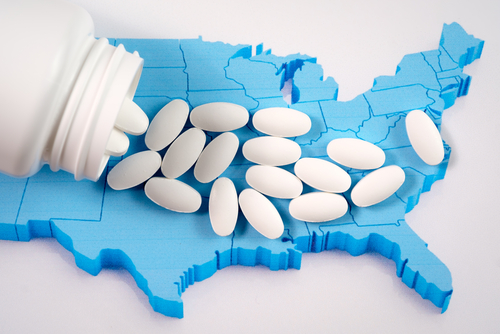Unfortunately, while the problem of addiction in the US has been spiraling out of control for years, it’s only been exacerbated by the opioid epidemic. Opioids are some of the most addictive drugs that require a prescription. The problem is that patients begin using prescription opioids for pain management, and become dependent on them — even after they’ve healed. So the prescription runs out, but the craving for opiates does not. This leads to addicts seeking out illicit solutions, such as heroin, to supplement the drug that a doctor prescribed them in the first place.
According to Duquesne University’s online statistics concerning the heroin epidemic:
- Four out of five heroin users started on prescription opioids
- An estimated 23 percent of individuals who use heroin develop an opioid addiction
- Opioid overdoses kill 52 people every day.
- In 2015, 12.5 million people misused pain relievers
- In 2015, 20.5 million Americans age 12 or older had a substance abuse disorder — 2 million of which involved prescription pain relievers, and 591,000 involving heroin.
While the response has been noteworthy, there’s little certainty on exactly how this situation should be resolved.
One the one hand, higher regulatory measures and professional education could be helpful. experts at University of Reno Nevada cite Dr. Stefan G. Kertesz, who believes that this solution “takes the form of federal and state governments moving to fund substance abuse and addiction services and establishing more robust medication-assisted treatment efforts.”
On the other hand, this paradigm shift may sometimes deny patients medication who actually need opiates for pain management. Doctors and hospital staff, especially in ER rooms, for example, need to be legitimately concerned about addicts showing up for phony reasons. However, this puts some people in a tough spot. This includes patients like Jim Harold, who have osteogenesis imperfecta and have been using opiates to manage their extremely painful symptoms for years, are now complaining of harassment and unfair dosage cuts from doctors.
The point is that there’s no clear answer to this epidemic, and until the problem is stemmed at the source, rates of addiction will continue to soar. This necessitates clear treatment options for addicts, opioid or otherwise.
Alternative Medicines & Herbal Treatment
It used to be that 12-step programs were, without fail, the go-to drug addiction treatment option recommended to addicts. Now, medication is being used frequently in addiction treatment, and many have begun exploring the legitimacy of other alternative herbal therapies as well.
Prescription Medication
In her article “How is Medication Used in Treating Drug Addiction?”, Nicki Jenns writes that “the primary use of medication is to manage withdrawal symptoms, prevention from relapse & for the treatment of co-occurring disorders.”
American Addiction Centers lists these 13 drugs as the primary examples of “medications that are either specifically designed to work against substance use or that were designed for some other purpose but have “off-label” uses that make them noteworthy.”:
- Naltrexone (Vivitrol)
- Buprenorphine (Buprenex)
- Disulfiram (Antabuse)
- Acamprosate (Campral)
- Paroxetine (Paxil)
- Modafinil (Provigil)
- Desipramine (Norpramin)
- Mirtazapine (Remeron)
- Bupropion (Buproban)
- Gabapentin (Fanatrex)
- Vigabatrin (Sabril)
- Baclofen (Kemstro)
- Topiramate (Topamax)
These medications are generally prescribed by a doctor alongside close monitoring and even other forms of therapy. This list is by no means extensive, and Jenns makes a point to mention that “the research to find medication for treating cannabis and stimulants is still on.”
Cannabis
Unfortunately, the legal status of cannabis is still a gray area in many places, where states may have decided to legalize medical or recreational use of the plant while the federal government still considers it a Schedule I substance. Nevertheless, some are still turning to cannabis as an alternative pain management solution, as well as to break their addiction to opiates.
“Medical marijuana can be used as a replacement for these painkillers, with multiple studies showing its effectiveness for both chronic pain and neuropathic pain,” writes Jennifer E. Landis for HealthWorksCollective. “It could potentially be used to wean people off opioid pain relievers as well since cannabis has been shown to reduce the use of opioids and help with withdrawal symptoms that occur after someone stops taking prescription pain relievers.”
Some have pointed out that the legal risks associated with cannabis use as a treatment option equate switching one illicit substance for another, while others worry that enough research hasn’t been done on the substance to deem it a safe alternative.
Kratom
Another naturally occurring and somewhat controversial treatment method is kratom. Kratom comes from the leaf a tropical tree native to Southeast Asia, and has been used as a natural mood enhancer for hundreds of years. Now, people like Eric Mayhew Jr. are using it to break their decades-long addiction to opioids.
“What kratom does is kills your brain’s desire when you are addicted to opiates and you want opiates,” says Mayhew, 37, in article with WebMD. “It dulls your pain and you start to get your wits back again.”
Unfortunately for people like Mayhew who have experienced success with this treatment option, others see kratom in a different light, and would like to see it scheduled in the same vein as cannabis. Because there is so little research and only anecdotal evidence surrounding kratom, there is conflicting information, both positive and negative, as to whether or not it’s a viable treatment option, whether you can overdose on it, and whether kratom in and of itself is habit-forming. This is why, as is the case with cannabis, more research must be pursued.
“Currently, kratom isn’t strictly regulated within the United States. However, if more kratom research and kratom studies are conducted with health and safety in mind, stricter product standards and regulations for kratom could be introduced,” write the authors at KratomSpot. “Without more time dedicated to careful research, mitragyna speciosa [kratom] will likely remain misunderstood and misrepresented.”
Home Remedies
For those looking to steer clear of prescribed medicated therapies, and who are looking for natural remedies and OTC options beyond cannabis and kratom, Rachel Nall, writing for MedicalNewsToday lists home remedies for specific withdrawal symptoms:
- NSAIDS like ibuprofen can be effective for treating fever, chills, and sweating. She also recommends wearing comfortable cotton clothing to absorb sweat, with easily removable layers.
- St. John’s wort is an herb commonly used to treat conditions such as depression and insomnia, has been shown effective in reducing opiate withdrawal-related shaking and diarrhea in rats. This substance may interact with other medications — check with a physician before and use with caution.
- Imodium is an OTC medication available at most drugstores to reduce diarrhea symptoms.
- Melatonin is a sleep hormone that can be purchased OTC as a dietary supplement. While it may not work to promote sleep in all individuals, some find that this supplement helps them achieve quality rest, even while going through withdrawals.
Other home remedies or readily available alternative therapies include yoga and exercise as well as mindfulness activities such as meditation. In fact, a recent study has shown not only that mindfulness eases pain, but also why:
“Mindfulness is related to being aware of the present moment without too much emotional reaction or judgment,” explains researcher Dr. Fadel Zeidan. “We now know that some people are more mindful than others, and those people seemingly feel less pain,” he adds.
A mixture of herbs, OTC medicine and supplements, and mindfulness exercises and activities can help addicts kick their opioid addictions without prescription treatment or supervision by a doctor. However…
A Word of Caution
While you may feel compelled to kick alternative treatment, it’s always a good idea to seek medical supervision during opioid addiction therapies. Not only does this help to prevent relapse, but can also keep you alive. Make sure you always contact a doctor about any treatment options, including alternative treatment options, to make sure you’re doing things safely.
“It is generally thought that opiate withdrawal is unpleasant but not life-threatening, but death can, and does, occur,” write Shane Darke, Sarah Larney, and Michael Farrell. “Persistent vomiting and diarrhoea may result, if untreated, in dehydration, hypernatraemia (elevated blood sodium level) and resultant heart failure.”
While this is uncommon, it is possible. Because drug addiction is a medical condition, you should seek advice from a licensed practitioner before administering your own alternative therapies for opioid addiction treatment. No matter what option you choose, remember that, even though it might be tough, you’re doing this for your health.
Relapse can happen, but should not discourage you. Above all else remember: you CAN kick your addiction to opiates with a treatment suited to your personal needs.






